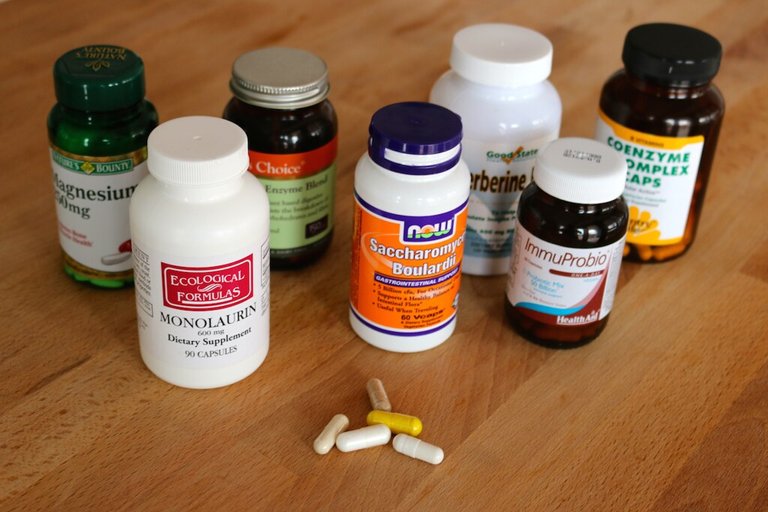The actual right time to take in probiotics (The beneficial bacteria).
I guess you have heard so many things about bacteria, but not all bacteria are harmful, some are helpful, and an excellent example of a friendly bacteria is PROBIOTICS. They are friendly bacteria that have several associated benefits. The human guts are filled with bacteria, most harmless and some beneficial to health.
Probiotics are taken in as supplements, these supplements help to strengthen the gut's microbiome. They are living organisms that make provision for several health benefits when they get ingested. Probiotics can be consumed through fermented supplements or foods.
There are different probiotics for different health challenges, so the right supplement must be taken to fit into the specific health issue.
Based on the obvious similarity between probiotics and prebiotics, it is very convenient to confuse them with one another. While probiotics are friendly and beneficial bacteria in the gut, prebiotics, on the other hand, are carbs in dietary fibers.
Probiotics are linked with several health benefits including regulated blood pressure, enhanced cardiac health, better skin health, and reduced inflammation. Keeping in mind that, good bacteria help with the elimination of bad bacteria and help with the return of balance, of course, probiotic supplements are a good way to have the bacteria added to the body.
The major function of probiotics in the body is to help with the maintenance of health, you know literally, when you are sick, bad bacteria find their way into the body and increase greatly in number, but then good bacteria enter into the body, it definitely makes you feel better. Good bacteria help you fight off bacteria and restore balance within the body, but it doesn't just end there;
Good bacteria help to;
- Create more vitamins.
- Help your body digest food appropriately.
_ Break down medications and absorb them. - Limits bad bacteria from getting out of control.
Several bacteria can be considered probiotics, but there are two common ones that can easily be found in stores, we have the; Lactobacillus and Bifidobacterium.
There is currently so much research going on about what probiotics could do for the body, but there are medical conditions where probiotics could help out greatly. Maybe not necessarily everyone is going to see the need to take some of these beneficial bacteria, but these signs may make you re-think on that decision if;
If you begin to experience a non-specific health symptoms like abdominal pain, decline in memory, serious fatigue, sleep disorder, depression, and brain fog.
If you have a medical case without a clear ineffable symptom.
You have recently adopted a healthy lifestyle, an improvement of your sleep, hygiene, and exercise diet.
Conclusion.
Probiotics are friendly bacteria that provide a great deal of health benefits when introduced into the body. The role of probiotics in the human body lies in maintaining of a balanced gut microbiome as it is essential for overall well-being. They still have a strong potential to alleviate a variety of health issues and enhance your quality of life, if you are looking for some good supplements to consider, then probiotics are certainly worth considering as part of a health-conscious lifestyle.
References.
https://www.webmd.com/digestive-disorders/probiotics-risks-benefits
https://www.eatingwell.com/article/8037462/benefits-of-taking-probiotics/
https://drruscio.com/what-are-the-signs-you-need-probiotics/
https://my.clevelandclinic.org/health/articles/14598-probiotics


Thanks for your contribution to the STEMsocial community. Feel free to join us on discord to get to know the rest of us!
Please consider delegating to the @stemsocial account (85% of the curation rewards are returned).
Thanks for including @stemsocial as a beneficiary, which gives you stronger support.
The article does a great job explaining why we should take probiotics, but doesn't get into the details of when to to take them.
My guess is that if a person takes a probiotic on an empty stomache, the stomache will simple break down the probiotics into food and you will lose the benefit of the probiotics.
My second guess is that one should take probiotics in conjunction with prebiotics. The question is when? Should one take the probiotics first then the prebiotics or the prebiotics before the probiotics.
How much time should lapse between the two events.
BTW: I understand that many things like leafy greens, cabbage or steel cut oats are considers prebiotic.
Some things like fermented sauerkraut, kimchi, fermented pickles and natto have both probiotics and prebiotics.
Thanks for the observation buddy, when it comes to the appropriate time to take probiotics, it is dependent on time and recommendation. Some manufacturers would recommend that the supplement be taken on an empty stomach, while others will recommend that it be taken with food.
It is best to read the prescription by the manufacturer before proceeding to take the supplement.